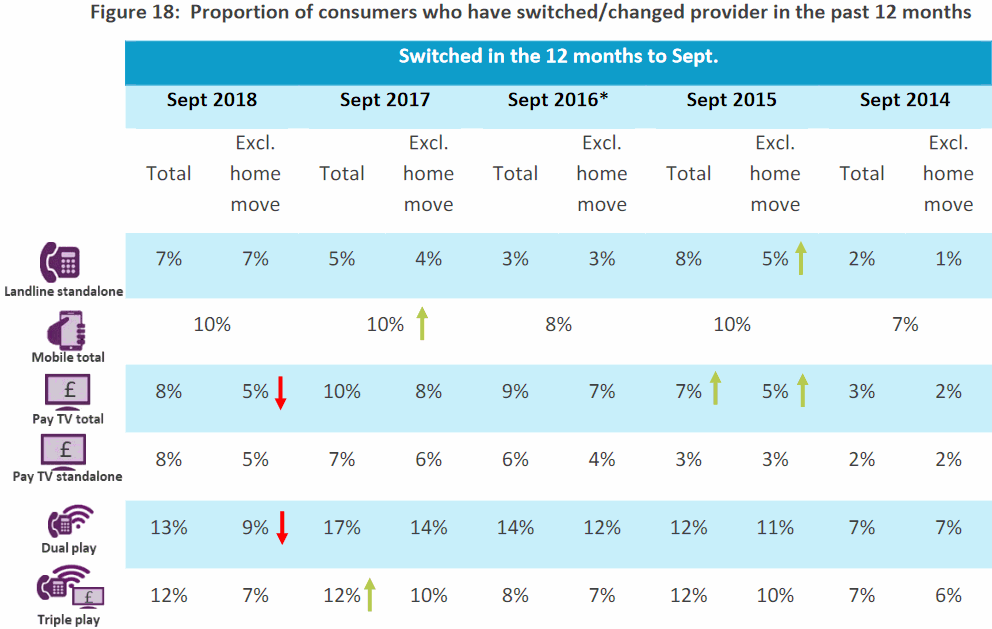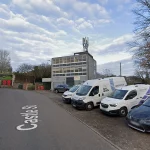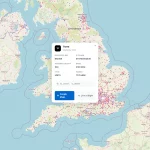Broadband Switching Declines as Hard Up Brits See Slower Speeds
Ofcom has today published a new report, which examines how affordability, take-up and engagement with UK telecoms, TV and postal services compares via different groups. Overall 13% of broadband and phone consumers switched ISP (down from 17% a year ago) and financially vulnerable people are less likely to have “superfast” speeds.
The Access and Inclusion in 2018 (PDF) report notes that people classified as being the “most financially vulnerable” are less likely to have a landline, mobile, fixed broadband and / or pay TV service and are more likely than average to live in a mobile-only household (28% vs an average of 21%).
Meanwhile 1% of households in the above group say they have neither a landline nor a mobile and 3 in 10 live in households without any internet access, while 8% have access only via a mobile. The most financially vulnerable who do have broadband are also “significantly less likely than average” to have a 30Mbps+ superfast broadband ISP connection (28% vs 40%); most likely due to the higher costs involved.
Advertisement
Elsewhere switching (changing provider) remains highest for the dual-play (broadband and phone) market, although it has declined a bit in the past year. In the pay-TV market switching also declined: from 8% in 2017 to 5% in 2018. Plus some 7% of consumers have switched landline provider in the stand-alone market in the past 12 months, and the same proportion have switched at least one service in their triple-play bundle (broadband, phone and TV). However mobile switching remains unchanged at 10%.

As you’d expect, seeking to reduce costs remains the main prompt for switching among dual-play, triple-play and pay-TV stand-alone customers, followed by finding a better deal with another provider. For mobile customers, it was the reverse; finding a better price/deal with another provider (37%) was more important than seeking to reduce current costs (28%).
Price rises by an existing ISP were also a factor that encouraged switching among dual-play (30%) and triple-play (31%) customers.
Advertisement
Internet Related Highlights from the Report:
* Some 49% of those with internet at home have sent a parcel in the last month compared to 21% of those without the internet. Those with internet sent an average of 2.1 parcels in the last month compared to 1.0 sent by those without the internet.
* Half of older (65+) dual-play customers are either out of contract (25%) or do not know their contract status (24%), significantly higher than average (38% combined).
* Dual-play customers in the ‘most financially vulnerable’ segment are also less certain of their contract status i.e. 19% are unsure if their contract has ended vs. 12% of those in the least financially vulnerable segment.
* Dual-play consumers aged 55+ are more likely than other age groups to say they struggle to understand the language and terminology used (43% vs. 15%).
* Broadband customers aged 65+ are less confident than average about speaking to their current provider about deals (75% vs. 88%), as are broadband customers with a disability (78%).
* Older broadband consumers are significantly less likely than average to have ever changed their broadband provider (55% of broadband customers aged 65+ vs. 65% average).
* Landline (phone) ownership fell significantly in 2018 and has coincided with a rise in the number of people aged 75+ living in mobile-only households (up to 6%).
Over the past couple of years Ofcom has taken a range of actions to help protect vulnerable consumers, including securing a £7 per month line rental cut for BT’s landline-only customers, as well as capping call charges for directory enquiry services (118) and introducing rules requiring companies to identify and protect vulnerable customers.
The regulator has also begun a review of broadband pricing and they’re introducing a new system of contract notification letters, which will help to keep consumers informed about what they’re currently paying for and whether or not there may be cheaper options available.
The forthcoming 10Mbps USO may also help those in the most digitally disadvantaged areas to access a faster and more affordable broadband connection (due end of 2019).
Mark is a professional technology writer, IT consultant and computer engineer from Dorset (England), he also founded ISPreview in 1999 and enjoys analysing the latest telecoms and broadband developments. Find me on X (Twitter), Mastodon, Facebook, BlueSky, Threads.net and Linkedin.
« Broadband Voucher Scheme Extended for Smaller Businesses in Leeds

















































Comments are closed